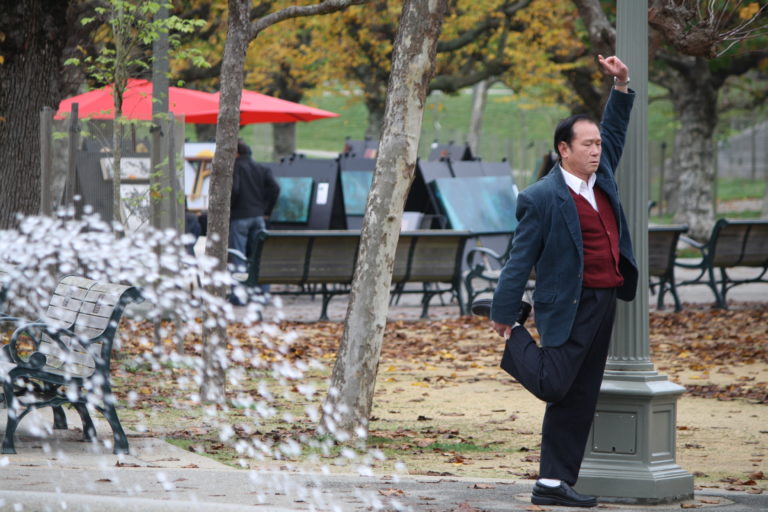
Image by Adam Bailey.
Effort Is the Path to the Possible
When I was young, I loved Batman more than Superman.
Superman had it easy. He had been born with superpowers. He could see into buildings with his X-ray vision and hear conversations from far away with his super hearing. He could outrun trains with his super speed, or pick them up and hurl them into space with his super strength. He could fly.
Batman, though, was my hero. He had no superpowers. Batman could bleed. He could be broken. He was driven by familiar emotions. He may have had a speedy, armored Batmobile and lots of bat gadgets, but Batman was fully human. Batman was going to live or die by his own wits and his own efforts, and all that made him more special to me than any of the other superheroes.
In a sense, the infinite is Superman. What else can we call something that can be in all places and all times at once, that is eternal and infinite? What else can Jews, Christians, and Muslims call a being who can create the entire universe and everything in it in six days? What else can we call Enlightenment or the Dao?
But our lack of omniscience, omnipotence, and omnipresence doesn’t mean that we are meant to be slackers. When we look at the world’s sacred texts, a point becomes clear: we are meant to be Batman.
The effort that we are meant to put forth is mighty. It’s not an “Oh well, I tried” effort. We are meant to strive because it is the only way that we can achieve our fullest potential. Through effort, we save ourselves, our communities, and perhaps our world. Through exerting what seems like super-human effort, we bring ourselves closer to the infinite.
Imagine Noah, mindful of what God wanted. “Build an ark,” God said, demanding an vessel three stories tall, more than 400 feet long, and over 70 feet wide — longer than an American professional football field, and approaching half as wide as one. Noah did not pull out his brand-name chainsaw and his big-box-store power tools, hire up a crew of workers, and whip out that ark in a few weeks. Noah cut down, stripped, sliced, and planed the trees, pegged the wood together, boiled the pitch and applied it, all by hand.
That construction effort took blood, sweat, muscle, resources, and anxiety. God didn’t say to Noah, “When you get off work at five o’clock, put in an hour or two a night from Monday to Friday, and see if you can get in an eight-hour day on the weekend.” God said, “Build the ark,” and given the enormity of the task and the impending consequences — do it or drown — we can bet safely that Noah built during every waking moment of every day.
Mindfulness is just as hard today.
In the spacious Jokhang Meditation Hall of Maitripa College in Portland, Oregon, not quite a dozen students sit cross legged on the smoothly polished bamboo floor on maroon and saffron cushions, facing their teacher and several life-sized gilded statues housed in a glass case that shone against a celestial blue background. The students are taking a class in Buddhist thought shifting, and working on memorizing and discussing eight verses designed to transform the mind to benefit all sentient beings.
The group re-considered the third teaching:
“Vigilant, the moment a delusion appears in my mind, endangering myself and others, I shall confront and avert it without delay.”
A woman with long, dark hair raised her hand, “It seems as if mindfulness is something that we are supposed to do every second,” she said in a slightly shocked and disbelieving tone.
The teacher fixed the group with a serious and steady look. “It is,” she said:
“Mindfulness is the most difficult task we will face in our lives. It is not for the faint of heart. To be mindful means to be working all the time.”
Immediately, I imagined the crushing labor of Atlas, bearing the entire sky upon his shoulders, forever keeping separated the Earth and the celestial sphere. The effort required to cultivate true compassion without becoming a doormat seems impossible, yet the Buddha’s effort showed that it can be and has been done, with the result of perfect, brilliant enlightenment.

To be a decent human and to do the right thing can be hard. In a 2007 poll of 2,500 Wall Street workers, seven percent said that if they could make million, and the chances of getting caught were 50 percent, they would illegally use insider information. If there was no chance of getting caught, 58 percent admitted that they would act illegally.
Fortunately, effort has benefits. For example, a British study found that the more effort golfers exerted, the less anxiety they experienced, which resulted in improved performance. Professors whose classes are perceived to be hard receive better evaluations from students than professors whose classes are perceived to be easier.
Sometimes existence itself depends on extraordinary effort. In 2014, Ebola required such effort in West Africa. Dr. Philip Ireland, an Ebola doctor who contracted the disease, described the efforts to contain it and to keep people alive as similar to fighting a war. By the end of 2014, Time magazine would name those courageous Ebola fighters its “Person of the Year.”
To reach beyond our limits requires more of us than we think we can do. Without hard exercise, we cannot grow strong muscles. Without hard effort, we cannot grow a strong, good heart, a strong spirit, and a strong soul. Such effort makes us human super heroes. Like Batman, we must be willing to have a vision of the possible and to keep sight of the best of human nature, while standing firm against the worst.


Share your reflection